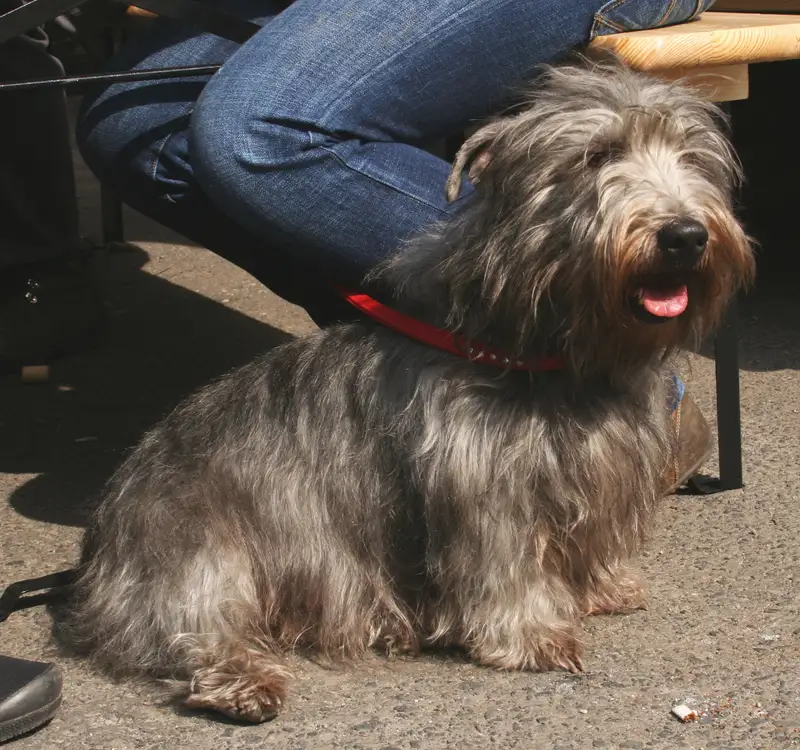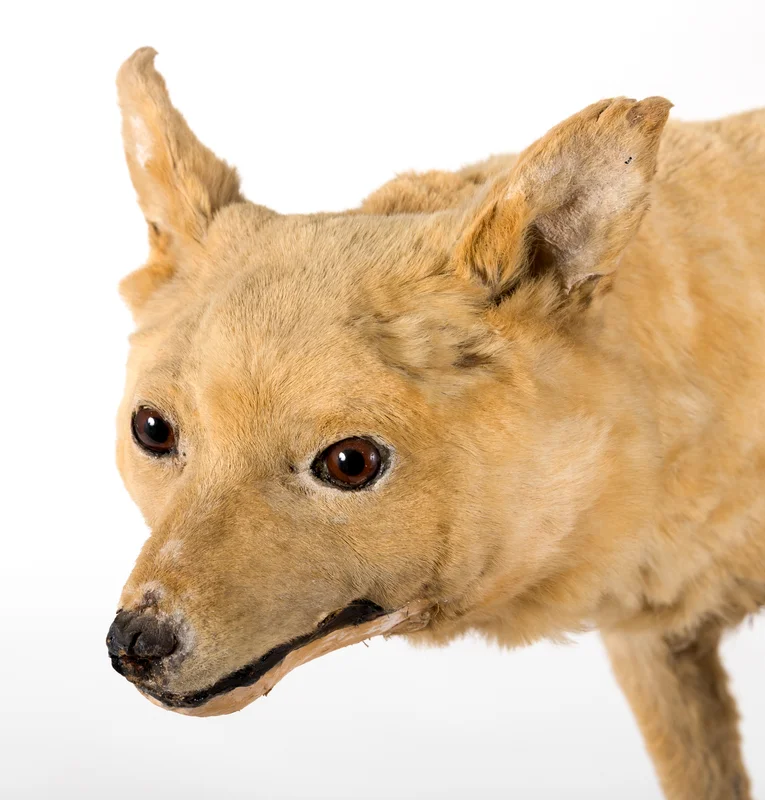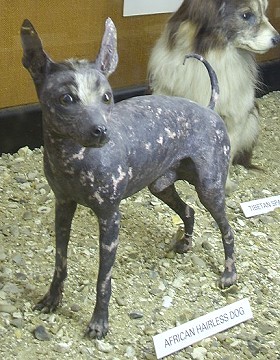Corsican Dog
Also known as: Corsican Dog, Cursinu
The Corsican Dog, or Cursinu, is a versatile breed known for its intelligence and loyalty. With a rich history as a hunting and herding dog, it thrives on exercise and mental stimulation, making it an excellent companion for active families.
⚡At a glance
🏆Best traits
Key Facts
- Height
- 46-58 cm
- Weight
- 18-29 kg
- Life Span
- 12 - 14 years
- Group
- Spitz and Primitive
- Origin
- Corsica
- Shedding
- Low
- Exercise
- 60 min/day
- Best For
- Families
Overview
🐕Breed Overview
✨Key Traits
💡What Makes Corsican Dog Special
The Corsican Dog stands out for its versatility and adaptability. Originally bred for herding and hunting, this breed excels in various tasks, showcasing its intelligence and work ethic.
Cursinus are known for their loyalty and strong protective instincts, making them excellent family companions. Their affectionate nature allows them to bond closely with their owners, while their playful spirit keeps them engaged in family activities.
Additionally, the breed's lack of specific health issues and robust constitution make it a resilient choice for dog owners.
The Corsican Dog, or Cursinu, is a remarkable breed with a rich history that dates back to the 16th century on the island of Corsica. Known for its versatility, the Cursinu has served as a loyal companion, herding dog, and hunting partner. With a height range of 18 to 23 inches and a weight that varies accordingly, this breed is characterized by its strong, athletic build and a coat that can be fringed in colors such as fawn, black and tan, or brown.
The breed's unique appearance is complemented by its close adherence of skin to the body, giving it a sleek look without the presence of dewlap. The Cursinu's temperament is as varied as its historical roles. Originally bred for hunting wild boar and herding livestock, this breed is intelligent and requires consistent training to harness its potential.
While it may need more training than some breeds, the Cursinu can develop into a wonderful companion for those who invest the time and effort. Its lack of specific health issues adds to its appeal, making it a robust choice for active families or individuals. Living with a Corsican Dog means embracing an active lifestyle.
This breed thrives on regular exercise and mental stimulation, making daily walks, play sessions, and engaging activities essential. The Cursinu's adaptability allows it to fit into various living situations, but it is best suited for homes with ample outdoor space where it can roam and explore. In summary, the Corsican Dog is a breed that embodies the spirit of its island home.
With its unique history, versatile abilities, and affectionate nature, the Cursinu is a breed worth considering for those seeking a loyal and active companion. Whether used for work or as a family pet, this breed continues to thrive thanks to dedicated enthusiasts who appreciate its heritage and capabilities.
🎉Fun Facts
Cursinus are known for their strong bond with their families and can be very protective of their loved ones.
Despite its historical decline, the breed has made a remarkable comeback thanks to dedicated enthusiasts.
The Cursinu has been a part of Corsican culture for centuries, serving various roles from herding to hunting.
Breed Characteristics
Family & Friends
Good Behavior
Get Up & Go
Household Harmony
Temperament & Personality
🐕Core Temperament
The Corsican Dog is characterized by its friendly and adaptable temperament. They are known for their loyalty and affection towards their families, often forming strong bonds with their owners.
Cursinus are generally good with children and can be protective, making them excellent family pets. While they may require more training than some breeds, their intelligence and eagerness to please make them receptive to learning.
Socialization is important to ensure they are well-adjusted and comfortable around strangers and other animals. Overall, the Cursinu's temperament makes it a versatile and loving companion.
💫Personality Profile
The Corsican Dog is known for its versatile and adaptable nature. This breed is intelligent and eager to please, making it relatively trainable with consistent guidance.
Cursinus are typically affectionate with their families, forming strong bonds and often seeking companionship. They can be protective, making them excellent watchdogs.
While they may be reserved around strangers, they are generally friendly and sociable with familiar people. Their playful demeanor and energy levels make them great companions for active families, but they also require mental stimulation to prevent boredom.
🔊Vocal Tendencies
The Corsican Dog has a moderate noise level. While they are not excessive barkers, they will alert their owners to any unusual sounds or intruders.
Their vocalizations typically include barking when excited or when they perceive a threat. With proper training and socialization, owners can manage their barking tendencies, ensuring that the Cursinu remains a well-mannered companion.
Overall, they are not known for being overly vocal, making them suitable for various living situations.
Affection & Social Traits
Warm and balanced socially — here’s how it shows up day to day.
Energy & Activity
Moderate, steady energy — great for matching your routine.
Communication Style
Generally quiet — a quick read on noise at home.
Care Requirements
🏃♂️Exercise Requirements
Daily Exercise
The Corsican Dog, or Cursinu, is a versatile breed that requires a moderate amount of exercise to maintain its physical and mental well-being. Ideally, an adult Cursinu should engage in at least 60 minutes of daily exercise, which can be broken down into two or three sessions. Activities such as brisk walks, running, and engaging in play with toys are excellent for this breed.
They also enjoy activities that stimulate their natural instincts, such as tracking or herding games. Puppies should have shorter, more frequent play sessions to avoid overexertion, while senior dogs may require gentler activities to accommodate their energy levels and joint health. Regular exercise not only helps manage weight but also reduces the risk of behavioral issues stemming from boredom or pent-up energy.
Insufficient exercise can lead to destructive behaviors and anxiety, making it crucial for owners to prioritize their Cursinu's activity needs.
Preferred Activities
🏠Living & Adaptability
Space Requirements
The Corsican Dog is adaptable to various living environments, but it thrives best in homes with ample outdoor space. While they can adjust to apartment living, it is essential that they receive sufficient exercise and mental stimulation.
A house with a secure yard is ideal, allowing the Cursinu to roam and explore safely. Owners in smaller spaces should ensure regular outings to parks or open areas where the dog can run freely.
The breed's size and energy level necessitate a space where they can engage in physical activities without feeling confined. Lack of adequate space can lead to frustration and behavioral issues, so potential owners should consider their living situation carefully.
Climate Preference
🍲Feeding Guide
Schedule
Food Types
Portion Size
Special Nutritional Needs
The Corsican Dog does not have specific dietary restrictions, but it is essential to provide a balanced diet rich in protein and essential nutrients to support its active lifestyle. Owners should monitor their dog's weight and adjust food portions accordingly, especially for less active individuals or seniors. Regular veterinary check-ups can help identify any dietary needs as the dog ages.
✨Grooming Requirements
Grooming Overview
The Corsican Dog has a short, dense coat that requires minimal grooming. Regular brushing, approximately once a week, is sufficient to remove loose hair and keep the coat healthy.
Bathing should be done as needed, typically every few months or when the dog becomes particularly dirty. Owners should also check the dog's ears regularly for dirt and wax buildup, cleaning them gently with a veterinarian-recommended solution.
Nail trimming should be done every few weeks to prevent overgrowth, and dental care should be part of the grooming routine to maintain oral health.
Care Schedule
Brush weekly, bathe as needed (every few months), trim nails every 2-4 weeks.
Health Profile
⚕️Health Care
Regular health care is crucial for maintaining the Corsican Dog's lifespan. Routine veterinary check-ups, vaccinations, and preventive treatments are essential to catch any health issues early.
Maintaining a healthy diet, providing regular exercise, and monitoring for any changes in behavior or health can significantly impact the dog's longevity. Owners should also be proactive about dental care, as oral health can affect overall well-being.
⏳Average Lifespan
Genetic Factors
Genetics play a role in the Corsican Dog's lifespan, as with any breed. While there are no specific hereditary health issues associated with the Cursinu, responsible breeding practices that prioritize genetic diversity can help reduce the risk of potential health problems. Prospective owners should seek reputable breeders who conduct health screenings and prioritize the overall health of their breeding stock.
Living Conditions
The Corsican Dog's lifespan can be influenced by various environmental factors, including housing conditions, climate, and social interactions. Dogs living in homes with ample outdoor space and opportunities for exercise tend to live longer, healthier lives.
Exposure to extreme weather conditions can also impact their health, so providing shelter and comfort during harsh climates is essential. Additionally, regular social interactions with humans and other animals contribute to their mental well-being, which can positively affect their longevity.
Training
🧠Intelligence & Trainability
💪Work Drive
The Corsican Dog has a strong work drive, stemming from its historical roles as a herding and hunting dog. This breed thrives when given tasks that challenge its intelligence and physical abilities.
Activities such as agility training, obedience trials, and scent work can provide the mental and physical stimulation the Cursinu craves. Engaging in these activities not only satisfies the dog's need for work but also strengthens the bond between the dog and its owner.
Without sufficient mental engagement, the Cursinu may become bored and exhibit undesirable behaviors.
⚠️Training Considerations
Training a Corsican Dog can present some challenges, particularly due to its independent nature and strong instincts. This breed may exhibit stubbornness, requiring consistent and patient training methods.
Early socialization is crucial to help the Cursinu develop good manners and adapt to various environments. Potential owners should be prepared to invest time in training, using positive reinforcement techniques to encourage desired behaviors.
Engaging the dog in activities that align with its natural instincts, such as tracking or herding, can enhance training effectiveness. Owners should also be aware of the breed's potential for strong prey drive, which may necessitate additional training to manage interactions with smaller animals.
📝Training Tips
To effectively train a Corsican Dog, owners should start with basic obedience commands and gradually introduce more complex tasks. Consistency is key; using the same commands and rewards will help reinforce learning.
Incorporating play into training sessions can keep the Cursinu engaged and motivated. Socialization with other dogs and people from a young age is essential to prevent any territorial or aggressive tendencies.
Training should be approached with patience, as the Cursinu may take longer to learn than some other breeds. Regular mental stimulation through puzzle toys or interactive games can also help keep the dog focused and reduce boredom.
History & Heritage
📜Origin Story
The Corsican Dog, or Cursinu, has its origins deeply rooted in the rugged terrain and rich culture of Corsica. Emerging in the 16th century, this breed was developed by local farmers and hunters who needed a reliable companion for various tasks. The Cursinu was utilized for herding sheep and cattle, as well as hunting wild boar, foxes, and hares.
Its adaptability and intelligence made it an invaluable asset to Corsican households. However, as modern breeds gained popularity, the Cursinu's numbers dwindled, leading to a decline in its presence. In the late 20th century, passionate breeders and enthusiasts recognized the need to preserve this unique breed, leading to the establishment of organizations dedicated to its recovery.
The Cursinu's resilience and the efforts of its advocates have ensured its survival and recognition as a cherished part of Corsican heritage.
⏳Development History
The Corsican Dog has a rich history dating back to the 16th century on the island of Corsica. Initially bred for its versatility, the Cursinu was used for hunting, herding, and as a loyal companion.
However, by the late 20th century, the breed faced decline due to competition from more popular continental breeds. In response, the L'Association de Sauvegarde du Chien Corse was established in 1989 to protect and promote the breed.
The efforts of dedicated enthusiasts led to the breed's recognition by the Société Centrale Canine in 2003, ensuring its preservation and continued presence in Corsican culture. The Cursinu is classified as a primitive breed, reflecting its historical significance and unique characteristics.
🛡️Purpose & Historical Role
Historically, the Corsican Dog was bred for a variety of working purposes, including herding livestock, hunting game, and serving as a loyal companion. Its versatility made it an essential part of rural life in Corsica, where it was employed as a sheepdog and for hunting wild boar, foxes, and hares.
The breed's strong instincts and adaptability allowed it to excel in various roles, making it a valuable asset to farmers and hunters alike. In modern times, the Cursinu continues to be appreciated for its working abilities and companionship, embodying the spirit of Corsican culture.
🏺Cultural Significance
The Corsican Dog, known as Cursinu, holds a significant place in Corsican culture and history. This breed has been a part of the island's heritage since the 16th century, serving as a versatile working dog for hunting and farming.
Its historical role in the community reflects the traditional lifestyle of Corsica, where these dogs were essential for herding livestock and hunting wild boar. The breed's recognition by the Société Centrale Canine in 2003 marks a revival of interest in preserving Corsican heritage and the unique traits of the Cursinu.
Today, the breed symbolizes the resilience of Corsican culture and the importance of maintaining local traditions in the face of modernization.
Conservation Status
The breed exists today and isn’t classified as extinct.
Less widespread; more likely to be region-specific or niche.
This breed is less common but has stable populations in certain regions.
?Frequently Asked Questions
Is the Corsican Dog good for apartment living?
The Corsican Dog can be moderate when it comes to apartment living. With adequate daily exercise and mental stimulation, apartment life can work, but they would benefit from more space. Regular walks and interactive play sessions are important for their well-being.
How much does a Corsican Dog shed?
The Corsican Dog sheds minimally compared to many other breeds. While no dog is truly hypoallergenic, this breed produces less loose hair than average. Routine brushing will help manage the little shedding they do.
Are Corsican Dogs easy to train?
The Corsican Dog can be moderate when it comes to training. They can learn commands and routines with consistent effort, though they may sometimes show a stubborn streak. Patience, positive reinforcement, and regular practice sessions will yield the best results.
How long do Corsican Dogs live?
The average lifespan of a Corsican Dog is 12 - 14 years. Lifespan can be influenced by genetics, diet, exercise, and overall health care. Regular veterinary check-ups and a healthy lifestyle can help your Corsican Dog live a long and happy life.
Is the Corsican Dog good with kids?
Yes, the Corsican Dog generally does well with children. They are patient and affectionate, making them a solid family dog. As with any breed, supervision during interactions with young children is always recommended.
How much exercise does a Corsican Dog need?
The Corsican Dog requires approximately 60 minutes of daily exercise. A combination of walks, play sessions, and mental stimulation activities will help keep them fit and happy. This is a moderate exercise requirement that fits well into most active lifestyles.
Is the Corsican Dog good with other pets?
The Corsican Dog can be moderate around other pets. They can get along with other animals when properly introduced and socialized from an early age. Gradual introductions and positive associations will help build harmonious relationships.









